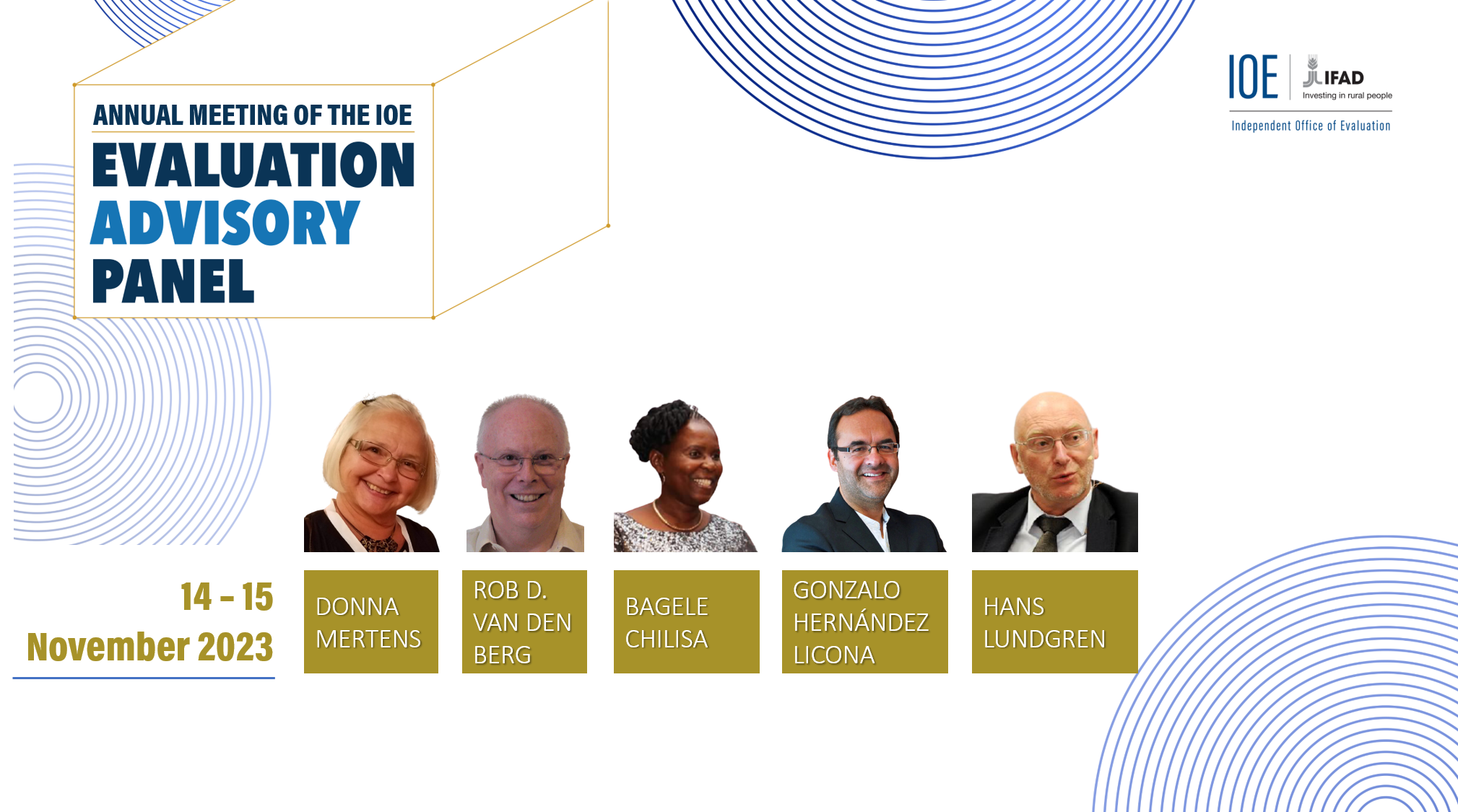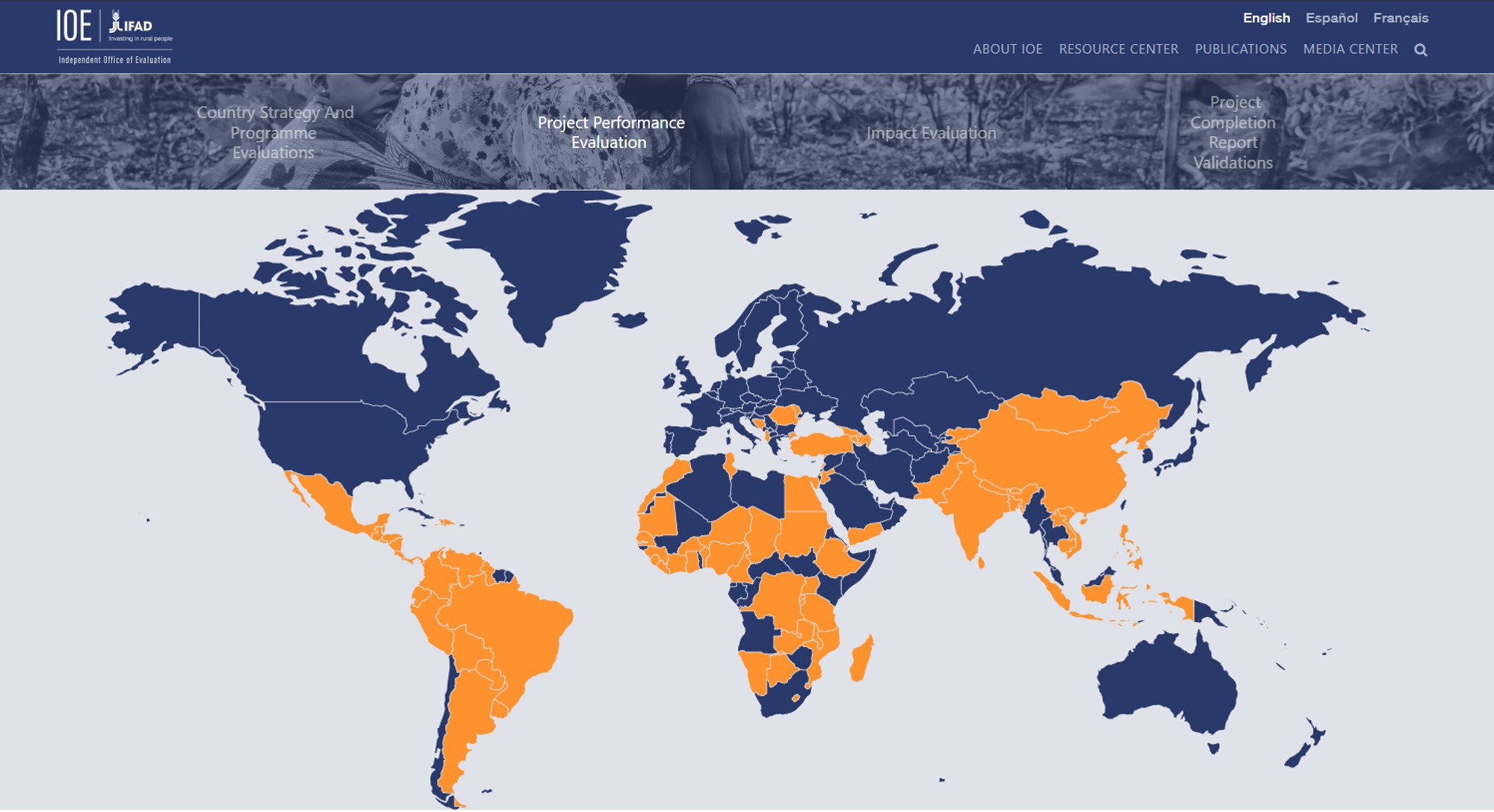New Evaluation Advisory Panel set to help IFAD make every investment count - IOE
Rome, 14 July 2022 – “I believe that the new Evaluation Advisory Panel will play an important role in moving forward with the effectiveness of the evaluation of our activities. At a time when we know that we are facing a looming crisis, with the shirking of fiscal space among our member states, we must make every investment count. This requires a rigorous evaluation function that can provide us with constructive critique and learning to ensure we continue to improve the quality of our delivery”. This, according to Gilbert Houngbo, president of the International Fund for Agricultural Development (IFAD), who delivered the opening address during the inaugural meeting of the Evaluation Advisory Panel (EAP) of the Independent Office of Evaluation of IFAD (IOE), on 12-14 July 2022.
Hosted in Rome, Italy, the hybrid meeting featured in-person sessions with active contributions from participants joining on-line. The event included the high-level presence of members of the Evaluation Committee and the Executive Board of IFAD, in addition to the directors of the FAO, WFP and CGIAR evaluation offices, in addition to a broad spectrum of IFAD senior management representatives.
“The establishment of the Advisory Panel is a milestone not only for IOE, but for IFAD as a whole, insofar as it will allow the organization to enhance its evaluation function by integrating external expertise into its existing independent and self-evaluation processes and products. We look forward to the Panel’s contribution to further promote development effectiveness in IFAD, which is more important than ever in such a critical moment”, reaffirmed Mei Hongyong, Deputy Permanent Representative of China to the UN Agencies for Food and Agriculture, echoing Dr Houngbo’s opening remarks.
The five members of the EAP are Rob van den Berg, Visiting Professor at King’s College London; Donna Mertens, Emeritus Professor at Gallaudet University; Bagele Chilisa, Professor at the University of Botswana; Gonzalo Hernández Licona, Director of the Multidimensional Poverty Network at the University of Oxford; and Hans E. Lundgren, formerly Head of the Evaluation Unit at OECD.
During the course of the inaugural three-day event, the EAP reviewed IFAD’s corporate needs and demand for evaluative findings and recommendations, including by discussing topics, levels of analysis, decision-making processes, and the use of evaluation for ex-ante quality assurance on project and country programme design. The esteemed panel also provided feedback to IFAD and IOE on the evolution of thinking in international development evaluation, gave advice on emerging priorities for evaluation, and participated in a session on the preparation of a Corporate-level Evaluation on Knowledge Management.
“IFAD is a very progressive organization because it emphasizes continuous improvement of methodologies, including data collection. This is essential, and points to the direction where we can have continuous improvement and help to ensure that evaluation findings are utilized. I come from the perspective of ‘no knowledge left behind’. This means that you have to be reflective all the time. For this to happen, you need to have an organizational structure that allows for bottom-up reflection. IFAD is doing very well in this regard, and it can do even better because it has that mindset to ensure that evaluation findings are utilized”, noted Bagele Chilisa, EAP member.
Members of the Evaluation Committee and the Executive Board of IFAD engaged prominently during the first day of the event, including by providing feedback to the inputs received from independent evaluation, discussing how they could obtain more value from independent evaluation, and analysing how they could make better use of findings and recommendations from independent evaluation.
“IFAD has come a long way in terms of where it is compared to where it was in terms of evaluation. It is probably the UN agency in Rome that has the most interest in evaluation, both internal and external. This is something that we, as member states, need to bring into the other organizations”, observed D. Miguel Jorge García Winder, Ambassador and Permanent Representative of Mexico to the Rome-based UN agencies.
IFAD senior management representatives were equally active, and illustrated key ongoing changes at IFAD, and underscored the ensuing demand for strategic and thematic evaluations. This included a brief presentation on the Updated Development Effectiveness Framework, and ongoing work to strengthen the Fund’s self-evaluation function.
“IOE is helping to place IFAD as a learning organization in the overall global architecture. The products and processes that are being led by IOE have been really critical in helping us to think about how we can put IFAD at the centre of the learning and forward-thinking agenda”, highlighted Jyotsna Puri, Associate Vice-President, Strategy and Knowledge Department at IFAD.
The IOE multi-year evaluation strategy, early insights on its implementation and ongoing reforms of methodology and independent evaluative products were at the centre of the presentation that Fabrizio Felloni, IOE Deputy Director delivered on behalf of the IOE directorate. In his presentation, Mr Felloni also touched upon tentative topics for future evaluations, and outlined the process that IOE has adopted to enrich engagement with IFAD management and collaboration with global evaluation networks.
The three-day meeting also afforded EAP members the opportunity to engage in bilateral meetings with the directors of the evaluation offices of FAO and WFP and CGIAR, as well as with a variety of IFAD senior managers, including, among others, representatives from the Programme Management Department, the Strategy and Knowledge Department, the Quality Assurance Group, and the Office of Audit and Oversight.
“There is more learning going on than we think. The organization is doing more and more adaptive management. This is tied to the whole process of evaluation, through its multiple levels of engagement, and through the clear and actionable recommendations contained in its reports. We see quite impressive new change processes taking place within IFAD, including through its new evaluation policy – which I find excellent –, new multi-year strategy and new evaluation manual”, affirmed Hans Lundgren, EAP member.
Indran Naidoo, IOE Director, appointed the first IOE EAP upon arriving at IFAD, in March 2021. The panel serves as a critical friend to IOE, drawing on its substantive experience and expertise to help improve the independence, credibility and utility of the Office. In this regard, the EAP is mandated to provide advice on quality assurance of IOE products of a strategic nature, develop options for strengthening technical and thematic expertise, identify potential topics for future evaluations, and strengthen the profile of IOE.
For further information, please contact Alexander Voccia [here]


